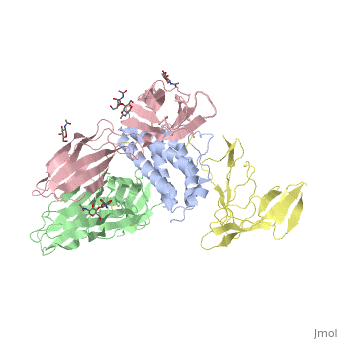2b5i
From Proteopedia
(Difference between revisions)
| Line 1: | Line 1: | ||
| - | + | ==cytokine receptor complex== | |
| - | === | + | <StructureSection load='2b5i' size='340' side='right' caption='[[2b5i]], [[Resolution|resolution]] 2.30Å' scene=''> |
| - | + | == Structural highlights == | |
| + | <table><tr><td colspan='2'>[[2b5i]] is a 4 chain structure with sequence from [http://en.wikipedia.org/wiki/Homo_sapiens Homo sapiens]. Full crystallographic information is available from [http://oca.weizmann.ac.il/oca-bin/ocashort?id=2B5I OCA]. For a <b>guided tour on the structure components</b> use [http://oca.weizmann.ac.il/oca-docs/fgij/fg.htm?mol=2B5I FirstGlance]. <br> | ||
| + | </td></tr><tr><td class="sblockLbl"><b>[[Ligand|Ligands:]]</b></td><td class="sblockDat"><scene name='pdbligand=NAG:N-ACETYL-D-GLUCOSAMINE'>NAG</scene><br> | ||
| + | <tr><td class="sblockLbl"><b>[[Gene|Gene:]]</b></td><td class="sblockDat">IL2 ([http://www.ncbi.nlm.nih.gov/Taxonomy/Browser/wwwtax.cgi?mode=Info&srchmode=5&id=9606 Homo sapiens]), IL2RB ([http://www.ncbi.nlm.nih.gov/Taxonomy/Browser/wwwtax.cgi?mode=Info&srchmode=5&id=9606 Homo sapiens]), IL2RG ([http://www.ncbi.nlm.nih.gov/Taxonomy/Browser/wwwtax.cgi?mode=Info&srchmode=5&id=9606 Homo sapiens]), IL2RA ([http://www.ncbi.nlm.nih.gov/Taxonomy/Browser/wwwtax.cgi?mode=Info&srchmode=5&id=9606 Homo sapiens])</td></tr> | ||
| + | <tr><td class="sblockLbl"><b>Resources:</b></td><td class="sblockDat"><span class='plainlinks'>[http://oca.weizmann.ac.il/oca-docs/fgij/fg.htm?mol=2b5i FirstGlance], [http://oca.weizmann.ac.il/oca-bin/ocaids?id=2b5i OCA], [http://www.rcsb.org/pdb/explore.do?structureId=2b5i RCSB], [http://www.ebi.ac.uk/pdbsum/2b5i PDBsum]</span></td></tr> | ||
| + | <table> | ||
| + | == Disease == | ||
| + | [[http://www.uniprot.org/uniprot/IL2RA_HUMAN IL2RA_HUMAN]] Genetic variations in IL2RA are associated with susceptibility to diabetes mellitus insulin-dependent type 10 (IDDM10) [MIM:[http://omim.org/entry/601942 601942]]. A multifactorial disorder of glucose homeostasis that is characterized by susceptibility to ketoacidosis in the absence of insulin therapy. Clinical fetaures are polydipsia, polyphagia and polyuria which result from hyperglycemia-induced osmotic diuresis and secondary thirst. These derangements result in long-term complications that affect the eyes, kidneys, nerves, and blood vessels.<ref>PMID:17676041</ref> [[http://www.uniprot.org/uniprot/IL2_HUMAN IL2_HUMAN]] Note=A chromosomal aberration involving IL2 is found in a form of T-cell acute lymphoblastic leukemia (T-ALL). Translocation t(4;16)(q26;p13) with involves TNFRSF17. [[http://www.uniprot.org/uniprot/IL2RG_HUMAN IL2RG_HUMAN]] Defects in IL2RG are the cause of severe combined immunodeficiency X-linked T-cell-negative/B-cell-positive/NK-cell-negative (XSCID) [MIM:[http://omim.org/entry/300400 300400]]; also known as agammaglobulinemia Swiss type. A form of severe combined immunodeficiency (SCID), a genetically and clinically heterogeneous group of rare congenital disorders characterized by impairment of both humoral and cell-mediated immunity, leukopenia, and low or absent antibody levels. Patients present in infancy recurrent, persistent infections by opportunistic organisms. The common characteristic of all types of SCID is absence of T-cell-mediated cellular immunity due to a defect in T-cell development.<ref>PMID:8401490</ref> <ref>PMID:8299698</ref> <ref>PMID:8088810</ref> <ref>PMID:8027558</ref> <ref>PMID:7937790</ref> <ref>PMID:7668284</ref> <ref>PMID:7557965</ref> <ref>PMID:7860773</ref> <ref>PMID:8900089</ref> <ref>PMID:9150740</ref> Defects in IL2RG are the cause of X-linked combined immunodeficiency (XCID) [MIM:[http://omim.org/entry/312863 312863]]. XCID is a less severe form of X-linked immunodeficiency with a less severe degree of deficiency in cellular and humoral immunity than that seen in XSCID.<ref>PMID:7883965</ref> <ref>PMID:9399950</ref> | ||
| + | == Function == | ||
| + | [[http://www.uniprot.org/uniprot/IL2RA_HUMAN IL2RA_HUMAN]] Receptor for interleukin-2. [[http://www.uniprot.org/uniprot/IL2_HUMAN IL2_HUMAN]] Produced by T-cells in response to antigenic or mitogenic stimulation, this protein is required for T-cell proliferation and other activities crucial to regulation of the immune response. Can stimulate B-cells, monocytes, lymphokine-activated killer cells, natural killer cells, and glioma cells. [[http://www.uniprot.org/uniprot/IL2RG_HUMAN IL2RG_HUMAN]] Common subunit for the receptors for a variety of interleukins. [[http://www.uniprot.org/uniprot/IL2RB_HUMAN IL2RB_HUMAN]] Receptor for interleukin-2. This beta subunit is involved in receptor mediated endocytosis and transduces the mitogenic signals of IL2. | ||
| + | == Evolutionary Conservation == | ||
| + | [[Image:Consurf_key_small.gif|200px|right]] | ||
| + | Check<jmol> | ||
| + | <jmolCheckbox> | ||
| + | <scriptWhenChecked>select protein; define ~consurf_to_do selected; consurf_initial_scene = true; script "/wiki/ConSurf/b5/2b5i_consurf.spt"</scriptWhenChecked> | ||
| + | <scriptWhenUnchecked>script /wiki/extensions/Proteopedia/spt/initialview01.spt</scriptWhenUnchecked> | ||
| + | <text>to colour the structure by Evolutionary Conservation</text> | ||
| + | </jmolCheckbox> | ||
| + | </jmol>, as determined by [http://consurfdb.tau.ac.il/ ConSurfDB]. You may read the [[Conservation%2C_Evolutionary|explanation]] of the method and the full data available from [http://bental.tau.ac.il/new_ConSurfDB/chain_selection.php?pdb_ID=2ata ConSurf]. | ||
| + | <div style="clear:both"></div> | ||
| + | <div style="background-color:#fffaf0;"> | ||
| + | == Publication Abstract from PubMed == | ||
| + | Interleukin-2 (IL-2) is an immunoregulatory cytokine that acts through a quaternary receptor signaling complex containing alpha (IL-2Ralpha), beta (IL-2Rbeta), and common gamma chain (gc) receptors. In the structure of the quaternary ectodomain complex as visualized at a resolution of 2.3 angstroms, the binding of IL-2Ralpha to IL-2 stabilizes a secondary binding site for presentation to IL-2Rbeta. gammac is then recruited to the composite surface formed by the IL-2/IL-2Rbeta complex. Consistent with its role as a shared receptor for IL-4, IL-7, IL-9, IL-15, and IL-21, gammac forms degenerate contacts with IL-2. The structure of gammac provides a rationale for loss-of-function mutations found in patients with X-linked severe combined immunodeficiency diseases (X-SCID). This complex structure provides a framework for other gammac-dependent cytokine-receptor interactions and for the engineering of improved IL-2 therapeutics. | ||
| - | + | Structure of the quaternary complex of interleukin-2 with its alpha, beta, and gammac receptors.,Wang X, Rickert M, Garcia KC Science. 2005 Nov 18;310(5751):1159-63. PMID:16293754<ref>PMID:16293754</ref> | |
| - | + | ||
| - | + | From MEDLINE®/PubMed®, a database of the U.S. National Library of Medicine.<br> | |
| - | + | </div> | |
| - | + | ||
| - | + | ||
| - | + | ||
==See Also== | ==See Also== | ||
*[[Interleukin|Interleukin]] | *[[Interleukin|Interleukin]] | ||
*[[Interleukin receptor|Interleukin receptor]] | *[[Interleukin receptor|Interleukin receptor]] | ||
| - | + | == References == | |
| - | == | + | <references/> |
| - | + | __TOC__ | |
| + | </StructureSection> | ||
[[Category: Homo sapiens]] | [[Category: Homo sapiens]] | ||
[[Category: Garcia, K C.]] | [[Category: Garcia, K C.]] | ||
Revision as of 23:54, 29 September 2014
cytokine receptor complex
| |||||||||||


